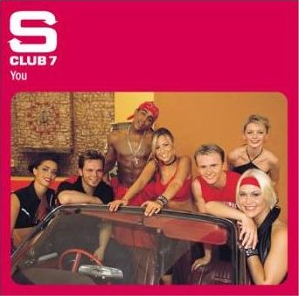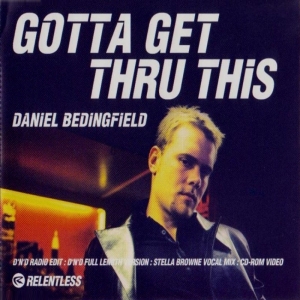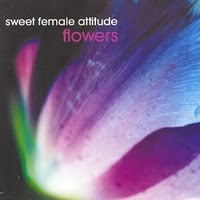Related Research Articles

"Murder on the Dancefloor" is a song written by Gregg Alexander and Sophie Ellis-Bextor, produced by Alexander and Matt Rowe for Ellis-Bextor's first album, Read My Lips (2001). Released on 3 December 2001, the song peaked at number two on the UK Singles Chart and stayed on the chart for 23 weeks. The song became a top-10 hit worldwide, charting within the top three in Australia, New Zealand, and four European countries. In the United States, where the song was serviced to radio in September 2002, the single reached number nine on the Billboard Dance Singles Sales chart. "Murder on the Dancefloor" is reported to have been the most played song in Europe in 2002.

Sabrina Fredrica Washington is a British singer who originally rose to fame as the lead singer of garage/R&B girl group Mis-Teeq.

"Long Hot Summer" is a song by English-Irish all-female pop group Girls Aloud, taken as the first single from their third studio album Chemistry (2005). The song was written by Miranda Cooper, Brian Higgins and his production team Xenomania, and produced by Higgins and Xenomania. "Long Hot Summer" was written for inclusion in the Disney film Herbie: Fully Loaded (2005), but plans fell through. Higgins later described the track as "a disaster record." Released in August 2005, it became Girls Aloud's first single to miss the top five on the UK Singles Chart, peaking at number seven.

"Ladies' Night" is a song by American band Kool & the Gang, released as the first single from their eleventh album of the same name (1979). It is a play on the popular use of "Ladies Nights" at bars and clubs that were meant to draw in more female patrons in order to draw in even more male clientele. The song as a single was a success, and became a radio staple. It was also a chart success, peaking at number eight on the US Billboard Hot 100 in 1980 and stayed atop the R&B charts for two weeks. It also gave them their first hit in the United Kingdom in August 1979, peaking at number nine in the UK Singles Chart.

"I Can't Wait" is a song by American group Nu Shooz, included on the band's second album, Tha's Right (1985). The song was remixed by Dutch DJ and producer Peter Slaghuis: this remixed version is the one that appears on the group's 1986 album, Poolside.

"You" is a song by British pop group S Club 7, released on 11 February 2002 as the final single from their third studio album, Sunshine (2001). The track served as the theme song to their third series, Hollywood 7, in 2001, and was the group's last single to feature band member Paul Cattermole. The song reached No. 2 on the UK Singles Chart, ranking at No. 70 on the year-end edition.

"Gotta Get Thru This" is the debut single of New Zealand-British singer Daniel Bedingfield. The song was released in November 2001 as the lead single from his debut studio album of the same name (2002). The track, along with some others, was recorded in Bedingfield's bedroom with his PC and a microphone, using the music software Reason.

"I Hope You Dance" is a crossover country pop song written by Mark D. Sanders and Tia Sillers and recorded by American country music singer Lee Ann Womack with Sons of the Desert. It is the title track on Womack's 2000 album. Released in March 2000, the song reached number one on both the Billboard Hot Country Singles & Tracks and Hot Adult Contemporary Tracks charts, and also reached number fourteen on the Billboard Hot 100. It is considered to be Womack's signature song, and it is the only Billboard number one for both Womack and Sons of the Desert.

"Can't Get Used to Losing You" is a song written by Jerome "Doc" Pomus and Mort Shuman, first made popular by Andy Williams in a 1963 record release, which was a number-two hit in both the US and the UK. Twenty years later, British band the Beat took a reggae re-arrangement to number three in the UK.

"Everybody" is a song by British pop group Hear'Say, written by Martin Harrington, Ash Howes, Richard Stannard, Julian Gallagher, and Andy Caine. Produced by Harrington and Howes, the track was recorded for the group's second studio album of the same name (2001), released nine months after their debut album, Popstars. "Everybody" was issued as the album's lead single on 26 November 2001 and was the final single released by the band before member Kym Marsh quit. Upon its release, the song peaked at number four on the UK Singles Chart. The song's music video is set inside a space capsule and shows the five band members dancing on a stage.

"Ain't Nothin' Goin' On but the Rent" is a song by American singer-songwriter Gwen Guthrie. It was released in 1986 as the lead single from her fourth album, Good to Go Lover (1986), on Polydor Records. It became the biggest hit of Guthrie's career, and the song's title became a semi-popular catchphrase among many women throughout the late 1980s and early 1990s. The single peaked at number five in the UK, but hit number one in New Zealand, Zimbabwe and on the US Billboard Hot Dance Club Play. In 1993, it was remixed and again charted in the UK, peaking at number 42. In 2005, Blender listed "Ain't Nothin' Goin' On but the Rent" at number 339 on its list of "Greatest Songs Since You Were Born".

"Flowers" is the debut single by UK garage duo Sweet Female Attitude, released on 3 April 2000. The song uses the same chord sequence as Erik Satie's Trois Gymnopédies, and the actual piece can be heard in the version by The House & Garage Orchestra, from the 2018 album Garage Classics.
UK garage, abbreviated as UKG, is a genre of electronic dance music which originated in England in the early to mid-1990s. The genre was most clearly inspired by garage house, but also incorporates elements from dance-pop, R&B, and jungle. It is defined by percussive, shuffled rhythms with syncopated hi-hats, cymbals, and snares, and may include either 4/4 house kick patterns or more irregular "2-step" rhythms. Garage tracks also commonly feature 'chopped up' and time-stretched or pitch-shifted vocal samples complementing the underlying rhythmic structure at a tempo usually around 130 BPM.
Ceri Evans, better known as Sunship, is an English record producer, DJ, remixer and jazz pianist.

"I Surrender" is a song written by former Argent guitarist and singer Russ Ballard and first released by Head East as a single in October 1980 from their sixth album U.S. 1. It is better known for being a hit for Rainbow the following year, reaching number 3 on the UK Singles Charts.
Rebecca Skingley, better known as Colour Girl, is a British singer.

"My Love" is a song by British singer Kele Le Roc. It was released as a single on 15 March 1999 as the second single from her debut album, Everybody's Somebody. Like her previous single "Little Bit of Lovin'", the song peaked at No. 8 on the UK Singles Chart, and it also peaked at No. 48 in New Zealand in January 2001. In 1999, the song won a MOBO Award for Best Single. Several remixes of the song became underground hits in the UK.
Genius Cru are a UK garage crew from London. They are best known for the song "Boom Selection" which reached No. 12 on the UK Singles Chart and No. 1 on the UK Dance Singles Chart in early 2001. Later the same year, they scored another top 40 hit with "Course Bruv".
Club Asylum is the name of UK garage musician Jeremy Sylvester. They were originally a duo which consisted of Sylvester and Paul Emanuel. After the duo decided to go their separate ways, Sylvester continued to produce and remix under the Club Asylum moniker as a solo artist, and is still active to the present day.
Amira Rasheed, or simply known as Amira, is a dance music singer best known for the song "My Desire" which charted three times on the UK Singles Chart, with its highest position at No. 20 in 2001. It also reached No. 1 on the UK Dance Singles Chart for one week in its first release in December 1997, and was also the first number one Dance hit of 1998 after it climbed back to the top of the chart three weeks later in the week ending 3 January 1998. The song was produced by house music group Blaze, and each release contains numerous mixes of the song, with a popular UK garage mix by the Dreem Teem. Capital Xtra included this version in their list of "The Best Old-School Garage Anthems of All Time".